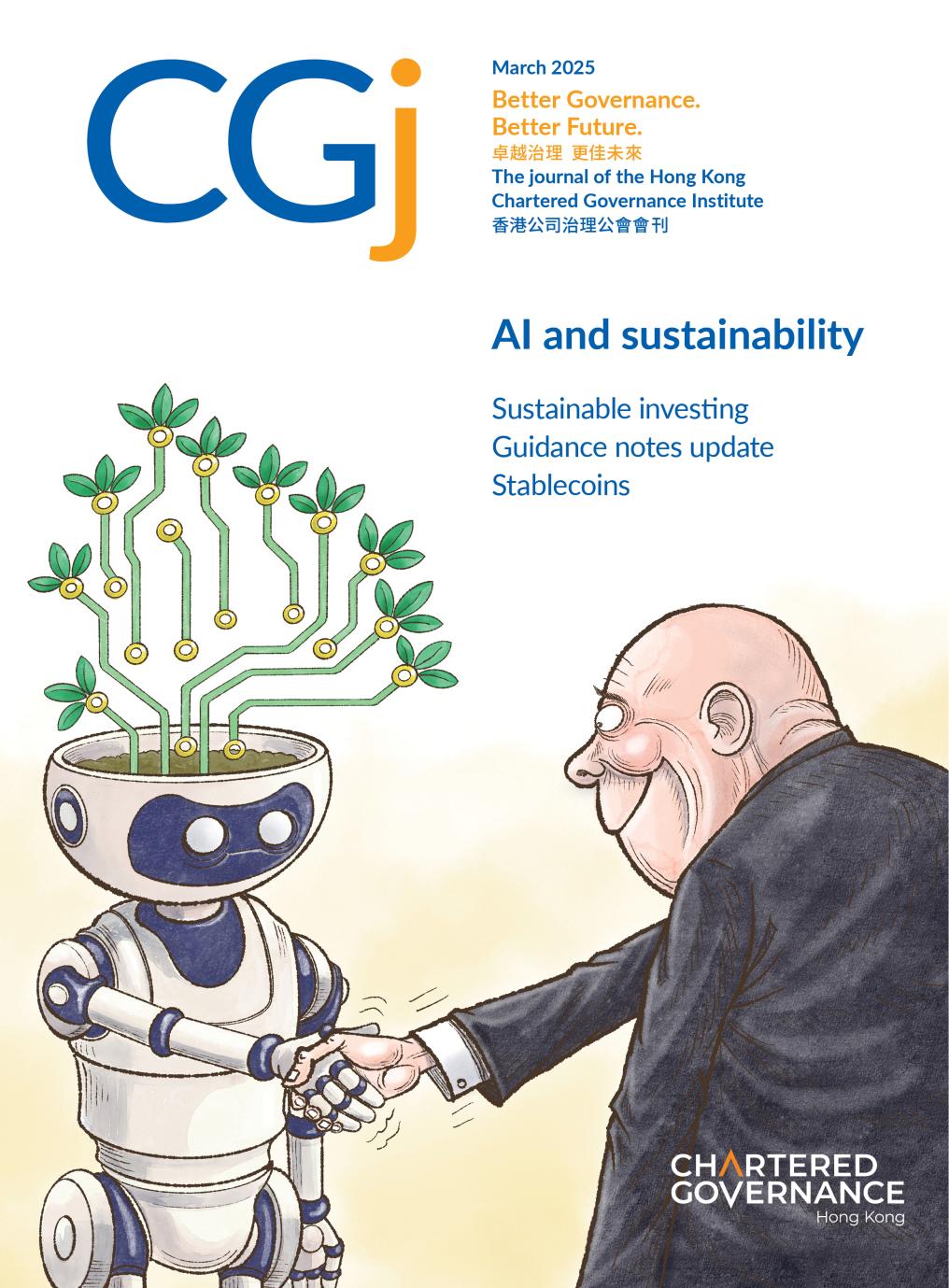
The importance of continuous learning for directors and good governance
Patricia Hui FCG HKFCG(PE), lawyer and governance professional, offers insights on why continuous learning is essential for directors to navigate challenges, enhance governance and drive organisational success.
Highlights
- continuous learning equips directors with the strategic foresight to anticipate challenges and seize opportunities for growth
- ethical leadership is strengthened when directors prioritise learning, fostering trust and transparency within organisations
- governance professionals play a key role in facilitating director education, ensuring boards remain informed and effective
In today’s dynamic and ever-evolving business landscape, directors are navigating a maze of complexities and increased expectations across various sectors – whether in corporate, nonprofit or governmental organisations. As stewards, they bear the vital responsibility not only of guiding their organisations toward achieving strategic objectives, but also of ensuring that ethical standards and governance principles are steadfastly upheld.
Embracing continuous learning is not merely important, it is empowering as it provides directors with the tools to enhance their decision-making capabilities and fortify governance practices. This article explores the importance of continuous learning for directors in all contexts, and examines how it shapes effective governance and boosts the directors’ abilities in their roles.
“Embracing continuous learning is not merely important, it is empowering as it provides directors with the tools to enhance their decision-making capabilities and fortify governance practices.”
The dynamics of change
The world is currently experiencing an unprecedented degree of volatility, uncertainty, complexity and ambiguity. Environmental concerns, technological advancements, geopolitical changes and societal expectations are reshaping industries and posing difficulties for conventional business models. There are also compounding and interconnected effects amongst the increasing number of uncertainties and disruptions – and less and less time for the leaders to react to them.
In the contemporary context, directors’ roles extend beyond traditional responsibilities. They must be visionaries, strategists and catalysts for change, leading their organisations through turbulent times.
Enhancing strategic decision-making
Effective governance requires directors to make strategic decisions that align with the organisation’s mission and vision. Continuous learning equips directors with the insights and analytical skills to evaluate complex situations and make informed choices.
Directors who engage in lifelong learning are better positioned to understand market trends, competitive landscapes and emerging risks. They can leverage this knowledge to develop strategies that drive organisational success while ensuring compliance with legal and ethical standards. This strategic foresight is crucial in preventing crises and seizing growth opportunities.
Fostering a culture of innovation
Continuous learning is not just an individual endeavour, but is a catalyst for fostering a culture of innovation within organisations. When directors prioritise learning and development, they set a precedent for other members of the organisation, encouraging a culture of continuous improvement and innovation.
Innovation is essential for organisations to stay competitive and relevant. By advancing a culture of continuous learning, leaders can motivate their teams to think creatively and to question existing norms. This shared dedication to learning can improve problem-solving skills and inspire a more adaptable organisational mindset.
Building resilience and adaptability
In an uncertain era, resilience and adaptability are essential traits for organisations. Resilient leaders embrace change and view challenges as opportunities for growth, while their adaptability enables them to pivot quickly in the face of evolving circumstances. Continuous learning empowers directors to develop these traits within themselves and throughout their organisations. By embracing a growth mindset, seeking new knowledge and experiences, and staying informed about best practices, industry standards and emerging trends, directors can better anticipate challenges and respond proactively.
“Resilient leaders embrace change and view challenges as opportunities for growth, while their adaptability enables them to pivot quickly in the face of evolving circumstances.”
Moreover, continuous education enables directors to develop emotional balance and interpersonal competencies essential for successful leadership. Resilient leaders can handle crises with composure, promoting trust and stability in their organisations. By leading through example, as well as demonstrating strength and resolve during difficulties, they motivate their teams to overcome obstacles and sustain motivation. This capacity to adapt to changing conditions reflects effective governance, ensuring that organisations remain responsive to the needs of their stakeholders.
Strengthening ethical leadership
Effective governance is fundamentally anchored in ethical leadership and accountability. Continuous learning plays a pivotal role in reinforcing ethical standards among board members. By engaging in various educational opportunities, directors can enhance their comprehension of ethical dilemmas and the significance of transparency and integrity in decision-making processes.
Ethical leadership transcends mere compliance – it necessitates the cultivation of a culture of integrity within the organisation. Directors who emphasise continuous learning are more adept at exemplifying ethical behaviour and encouraging open discussions regarding ethical challenges. This unwavering commitment to ethical principles is essential for bolstering stakeholder trust and maintaining the organisation’s reputation.
Enhancing stakeholder engagement
Effective governance involves engaging with stakeholders, including shareholders, employees, customers and the community. Continuous learning enables directors to understand these stakeholders’ diverse perspectives and interests.
By staying abreast of social and environmental issues, directors can make informed decisions that align with their stakeholders’ values. This engagement is essential for building strong relationships and ensuring that the organisation’s decisions reflect the interests of its stakeholders. Directors prioritising continuous learning can communicate more effectively with stakeholders, fostering transparency and collaboration.
Keeping abreast of regulatory changes
Compliance with laws and regulations is the cornerstone of good governance. Continuous learning allows directors to stay informed about changes in legislation, industry standards and regulatory requirements. This knowledge is critical for ensuring the organisation operates within legal boundaries and adheres to ethical practices.
Directors who engage in continuous learning can better assess the implications of regulatory changes for their organisations. This proactive approach to compliance mitigates legal risks and enhances the organisation’s credibility and reputation in the eyes of stakeholders.
How governance professionals can help
Governance professionals play an increasingly crucial role in facilitating continuous learning for directors, helping them stay ahead of the curve in a rapidly changing environment. Their strategic arrangement of a variety of training programmes, workshops and seminars that are specifically designed to focus on emerging trends, regulatory changes and best practices in governance is invaluable. This proactive approach not only enhances the knowledge base of the directors, but also equips them with the tools needed to respond effectively to new challenges, underscoring the integral role of governance professionals in the continuous learning process.
In addition to organising these valuable learning opportunities, governance professionals can curate a comprehensive range of resources and materials that support directors in their ongoing learning journeys. These resources may include articles, case studies, white papers and interactive digital content, all tailored to address the specific governance issues the board might face.
By fostering a robust culture of learning within the boardroom, governance professionals can ensure that the directors are well informed and well equipped to navigate the complexities of their roles. This commitment to continuous education ultimately supports the overarching principles of good governance, enabling boards to make informed decisions that contribute to their organisation’s long-term success and sustainability.
Conclusion
In conclusion, continuous learning transcends mere optionality for directors. It constitutes a vital necessity within the contemporary, complex and dynamic business and organisational landscape. By embracing continuous learning, directors can augment their strategic decision-making capabilities, promote innovation, cultivate resilience, reinforce ethical leadership, effectively engage stakeholders and ensure compliance with regulatory standards. Such attributes are indispensable to robust governance and the sustainable success of the organisation.
Patricia Hui FCG HKFCG(PE)
Lawyer and governance professional

